CPS Annual Meeting 2024
Meeting Co-Chairs: Dilantha Fernando (Dilantha.Fernando@umanitoba.ca) and Tom Fetch (tomfetchjr@outlook.com)
Meeting Coordinator: Brenda Trask (btrask@secan.com)
http://www.plantcanada.ca/eng/meeting.html
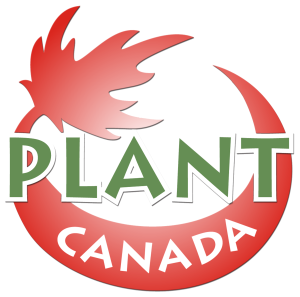
Plant Canada is a Federation of Canadian Plant Science Societies, a not-for-profit corporation, is an umbrella organization that seeks to bring together researchers, educators, extension personal, postdoctoral fellows and students in plant science and related disciplines in Canada.
The purposes of Plant Canada are: a. to organize and sponsor regular, effective scientific meetings and workshops under a national umbrella for plant science and related disciplines in Canada, b. to operate and maintain a strong communication network among Member Societies and their individual members, and c. to be a strong and effective force for public education and advocacy in plant and related sciences in Canada and globally. Plant Canada organizes Plant Canada conferences every four years.
Theme: Plants: Adapting to a changing world
Program
Oral Talks – alphabetical list
Poster Presentations – alphabetical list
Saturday July 6, 2024
| EXHIBITOR SET-UP starting from 12:00 – 18:00 | Hall D |
| EARLY POSTER SET-UP available from 15:00 – 18:00 | Hall D |
Sunday July 7, 2024
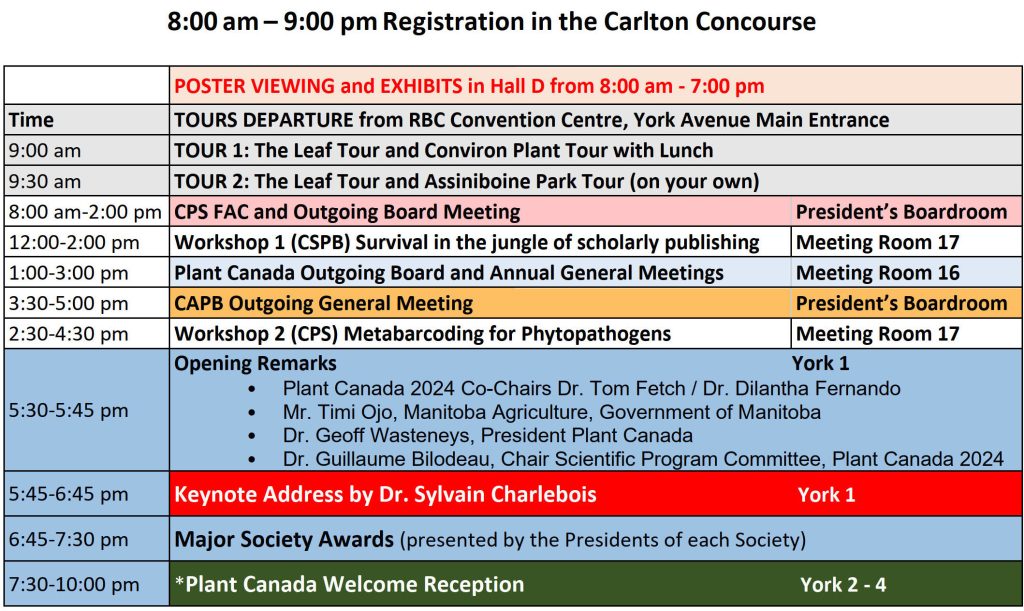
Monday July 8, 2024
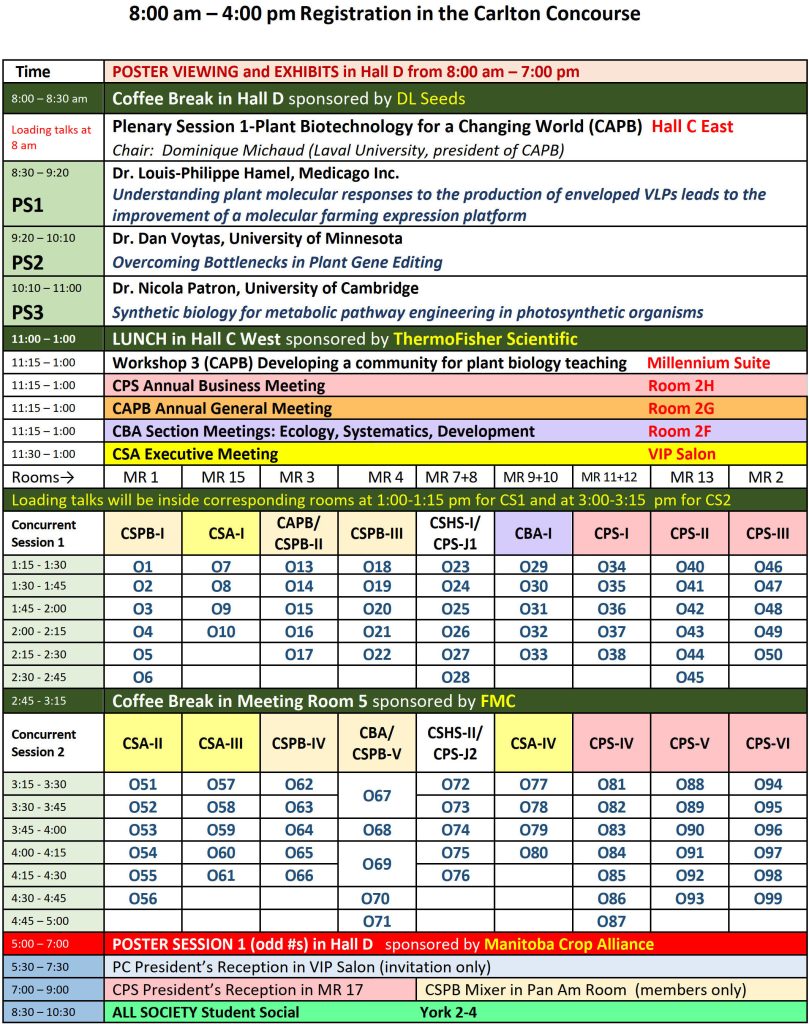
Tuesday July 9, 2024
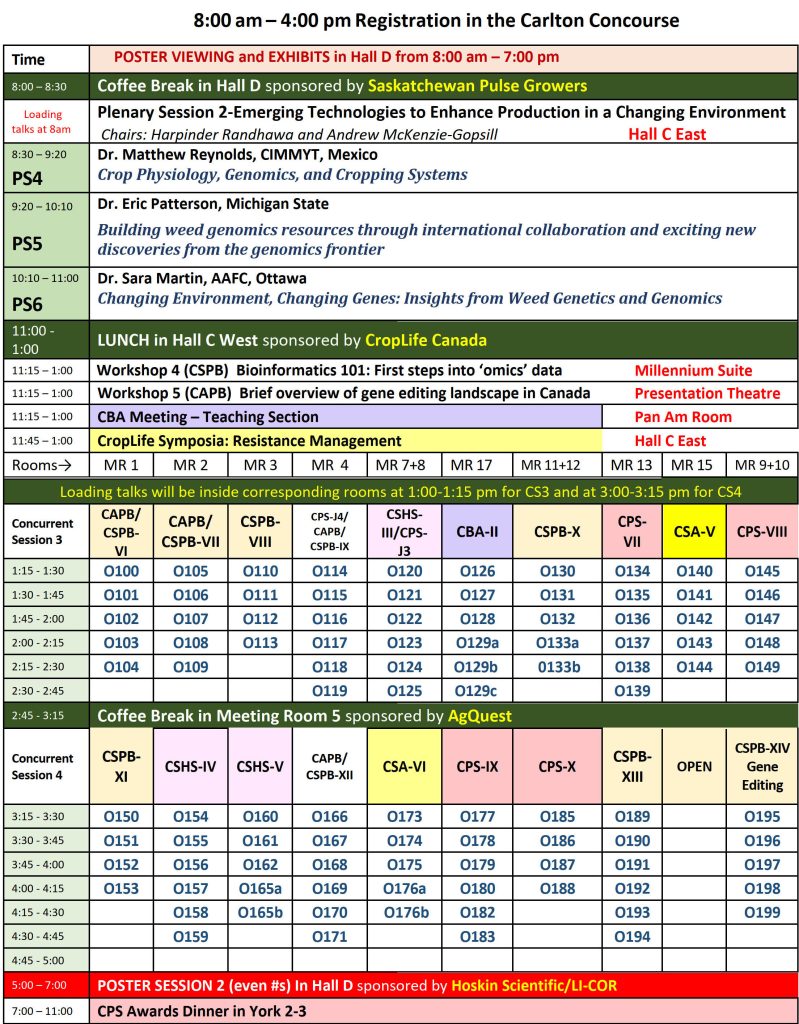
Wednesday July 10, 2024

Speakers
Keynote speaker, July 7

Dr. Sylvain Charlebois is a Professor in food distribution and policy in the Faculty of Management at Dalhousie University in Halifax. He is also the Senior Director of the Agri-food Analytics Lab, also located at Dalhousie University.
Known as “The Food Professor”, his current research interest lies in the broad area of food distribution, security and safety. He is one of the world’s most cited scholars in food supply chain management, food value chains and traceability. He co-hosts The Food Professor podcast, discussing issues in the food, foodservice, grocery and restaurant industries and which is the most listened Canadian management podcast in Canada. Every year since 2012, he has published the now highly anticipated Canadian Food Price Report, which provides an overview of food price trends for the coming year. Furthermore, his research has been featured in several newspapers and media groups, nationally as well as internationally. He has testified on several occasions before parliamentary committees on food policy-related issues as an expert witness. He has been asked to act as an advisor on food and agricultural policies in many Canadian provinces and other countries.
July 8 Plenary Speakers
Understanding plant molecular responses to the production of enveloped VLPs leads to the improvement of a molecular farming expression platform.

Dr. Louis-Philippe Hamel is an expert of the plant innate immune system with a unique expertise in the biopharmaceutical industry and in the field of plant molecular farming. Formerly employed by Medicago, his most recent work aims at understanding plant’s responses to Agrobacterium-mediated expression of recombinant proteins in plants, including for the production of plant-made vaccines and antibodies. In addition to these fundamental aspects, his research focuses on the development of genetic and non-genetic approaches to improve plant molecular farming practices. During his Ph.D and as a postdoc fellow at the University of Sherbrooke and at Harvard University, Dr. Hamel worked on intracellular signaling pathways that lead to the activation of plant defense, including downstream of resistance proteins and mitogen-activated protein kinase cascades. His work highlighted several defense activation routes, including through the degradation of defense repressors that inhibit resistance mechanisms in the absence of stress.
Synthetic biology for metabolic pathway engineering in photosynthetic organisms.

Nicola Patron is an Associate Professor in Plant Synthetic at the University of Cambridge, UK. Nicola has a PhD in plant molecular biology and pursued postdoctoral research at The John Innes Centre and The University of British Columbia. In 2015, she was identified as an emerging leader in synthetic biology and awarded a SynBioLEAP fellowship. She started her research group at the Earlham Institute in 2016 to apply engineering approaches to plant biology. Her group relocated to Cambridge in February 2024 and is focused on understanding how phenotypes emerge from network functions and exploring and utilising metabolic diversity.
Overcoming Bottlenecks in Plant Gene Editing

Dr. Dan Voytas is a Professor in the Department of Genetics, Cell Biology and Development and the Director of the Center for Precision Plant Genomics at the University of Minnesota. Dr. Voytas graduated from Harvard College in 1984 and received his Ph.D. from Harvard Medical School in 1990. He conducted postdoctoral research at Johns Hopkins University School of Medicine. Prior to joining the University of Minnesota in 2008, Dr. Voytas was a professor at Iowa State University. Dr. Voytas’ research focuses on developing methods to edit plant genomes. Dr. Voytas’ lab is currently optimizing methods for efficiently making targeted genome modifications in a variety of plant species to advance basic biology and develop new crop varieties. In addition to his position at the University of Minnesota, Dr. Voytas co-founded Calyxt, an agricultural biotechnology company that used gene editing for crop improvement. In 2019, Dr. Voytas was elected to the National Academy of Sciences.
July 9 Plenary Speakers
Crop Physiology, Genomics and Cropping Systems

Matthew Reynolds (m.reynolds@cgiar.org) leads Wheat Physiology at CIMMYT, developing breeding technologies for climate resilience and yield improvement. He has fostered global collaborations to tap expertise and emerging technologies in basic plant sciences for translation to breeding. Networks initiated include the International Wheat Yield Partnership https://iwyp.org/, and the Heat and Drought Wheat Improvement Consortium https://hedwic.org/- , whose products provide breeders globally with unique pre-breeding material with new combinations of complex physiological traits and their haplotypes. He has published widely in crop physiology, genomics and pre-breeding and since 2018 is listed among top 1%, of world’s researchers in plant & animal science (Web of Science). He was recently invited to compile as wheat textbook as editor, which was published open access in 2022 https://link.springer.com/book/10.1007/978-3-030-90673-3. He co-supervises PhD thesis projects through his links with Universities worldwide and has developed physiological manuals for use by national programs which have been translated into several languages.
Building weed genomics resources through international collaboration and exciting new discoveries from the genomics frontier
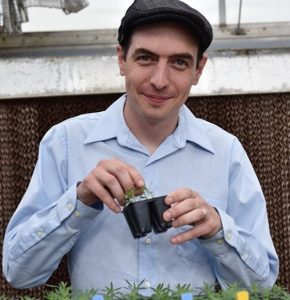
Eric Patterson is an Assistant Professor in Weed Science in the Department of Plant, Soil, and Microbial Sciences at Michigan State University where he teaches weed science to Undergraduate and Graduates. His research focuses on more basic aspects of weed science including weed genomics, molecular biology of resistance mechanisms, rapid molecular weed diagnostics, and herbicide mode of action discovery. His lab is especially interested in how genome rearrangements (i.e. transposable elements and copy number variation) form and are utilized as novel sources of genetic variation for weed adaptation to abiotic stresses.
Changing Environment, Changing Genes: Insights from Weed Genetics and Genomics

Dr. Sara L. Martin is a research scientist at Agriculture and Agri-Food Canada’s Ottawa Research and Development Centre. She holds a B.Sc in Botany from the University of Toronto and a Ph.D. in Integrated Biology from the University of Guelph. Her research program’s mandate is to develop our understanding of how gene flow between crop and wild species could lead to transgene escape, with a secondary focus on the evolution and spread of herbicide resistance in weeds. As a result, her work ranges from field work to document the current geographic range of species, to greenhouse work creating hybrids, to the assembly, analysis and use of plant genomes. Her work has investigated kochia, fleabane, ragweed, wild mustard, cleavers, and the wild relatives of Camelina.
July 10 AM Plenary Speakers
Intergenic spaces: A new frontier to improving plant health

Jan Leach is a molecular plant pathologist who studies the basis of plant disease susceptibility and resistance and how these responses are influenced by interactions within the phytobiome. She is a University Distinguished Professor in the Department of Agricultural Biology at Colorado State University. Leach is the Immediate Past President of the International Society of Plant Pathology and is a Fellow and a past President of the American Phytopathological Society (APS). Leach was elected to the US National Academy of Sciences in 2021.
The Petota super-pangenome and potato wild relatives

Dr. Strömvik leads a bioinformatics research program focusing on complex polyploid genomes of plants (e.g. arctic and temperate Oxytropis sp., and potato wild relatives). She completed a Ph.D. in Crop Sciences (plant molecular genetics of soybean) at University of Illinois at Urbana-Champaign (USA), and a B.A. in Theoretical Philosophy as well as a M.Sc. in Biology (tissue culture and transformation in Picea abies) at Stockholm University (Sweden). She carried out postdoctoral studies in Bioinformatics and Computational Genomics at University of Minnesota, Minneapolis (USA) working on genomics projects in soybean, Medicago truncatula and loblolly pine. In 2003 she joined McGill’s Department of Plant Science where she pioneered the development of university-wide graduate bioinformatics programs and courses. She serves on national and international grant panels, as Associate Editor for several journals, and as Chair of the Department of Plant Science since 2015.
Combating a dynamic wheat rust population in Canada

Dr. Brent McCallum is a research scientist with Agriculture and Agri-Food Canada working at the Morden Research and Development Centre in Morden Manitoba. He received his Ph.D in Plant Pathology from the University of Minnesota in 1995 and started working at AAFC in 1996. His research focus is on wheat leaf rust disease in Canada. He conducts an annual national virulence survey in Canada to track changes in the pathogen population that could affect the wheat crop in Canada. He is involved in identifying and developing sources of resistance to use in future wheat cultivars and to understand the genetics of disease resistance. This includes mapping and marker development for genes of interest, host-parasite interactions, and understanding interactions between resistance genes. He is also involved in research projects on the causal rust, Puccinia triticina, to understand its pathogenesis, diversity and evolution.
July 10 PM Plenary Speakers
Building plant biomass: secondary cell wall biosynthesis.

Professor Samuels has a B.Sc. in Neurobiology from McGill University in Montreal, and a Ph.D. in Botany, from the University of British Columbia in Vancouver, BC., Canada. She did post-doctoral studies at the University of Colorado, Boulder, USA and at UBC Vancouver, where she has been a faculty member since 2000. Professor Samuels initiated the UBC node of the graduate teaching training network called the Centre for the Integration of Research, Learning, and Teaching (CIRTL). She is Academic Director of the Bioimaging Facility, a campus-wide light and electron microscopy shared research facility, and a member of the UBC Bioproducts Institute. The goal of Samuels’ research is to integrate plant cell biology and biochemistry to discover how plant cells produce valuable renewable resources.
Modifying the plant cell wall from the inside out.

Dr. Heather E. McFarlane is an Assistant Professor and Canada Research Chair in Plant Cell Biology in the Department of Cell & Systems Biology at the University of Toronto. She earned her PhD at the University of British Columbia (Canada) where she studied the transport of lipids that form the protective plant cuticle. After her PhD, she joined the Max Planck Institute for Molecular Plant Physiology (Germany) to study cell wall synthesis as an EMBO postdoctoral fellow. She then moved to University of Melbourne (Australia) where she was awarded an Australian Research Council Discovery Early Career Researcher Award to initiate her work on cell wall signaling. Heather joined the Department of Cell and Systems Biology at the University of Toronto July 2019. The McFarlane Lab studies cell wall synthesis, secretion, signaling, and remodeling with a view to improving plant biomass for food, materials, and energy.
Acids for sustainable growth in agriculture and fermentation

Dr. Guanqun (Gavin) Chen is an Associate Professor and Canada Research Chair in Plant Lipid Biotechnology in the Department of Agricultural, Food, and Nutritional Science at the University of Alberta, Canada. His research interests include expanding our understanding of storage lipid biosynthesis and developing biotechnological approaches to enhance oil yield and quality in both plants and microorganisms. This knowledge platform will further enable him to redesign lipid biosynthesis in these organisms, producing unusual fatty acids for applications in food, nutraceuticals, and industrial settings.
The heritability of chromatin accessibility in Zea mays.

Dr. Mark Allan Alexander Minow received his PhD in plant molecular biology and genetics in the department of Molecular and Cellular Biology at the University of Guelph in 2020 for his study of plant small RNA biology and the regulation of the maize floral transition. He is currently a Postdoctoral Research Associate at the University of Georgia under the supervision of Dr. Robert Schmitz, exploring maize biology through molecular genetics and single-cell genomics. An avid plant lover, when not in the lab, Dr. Minow is usually found landscaping his 2.5-acre property, nestled in the abandoned cotton terraces of rural North Georgia.
Sponsors
Platinum Sponsors

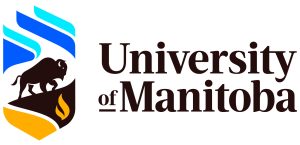
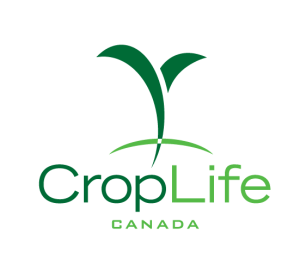

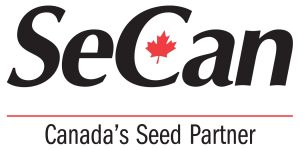
Gold Sponsors

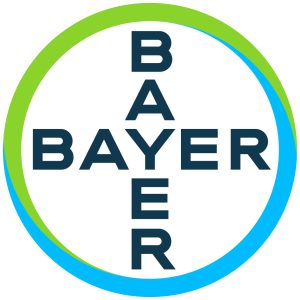



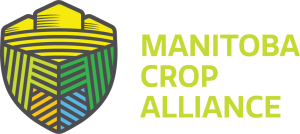
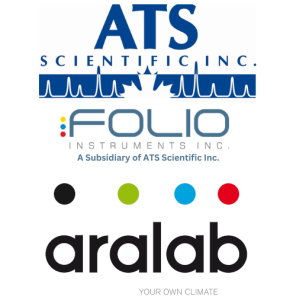

Silver Sponsors

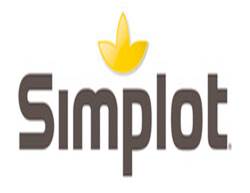
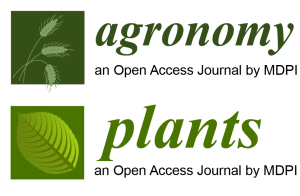
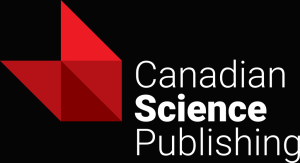
Bronze Sponsors
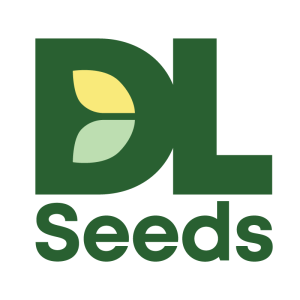

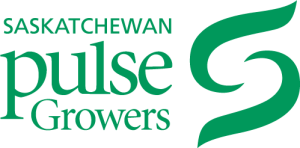


Friends of Plant Canada

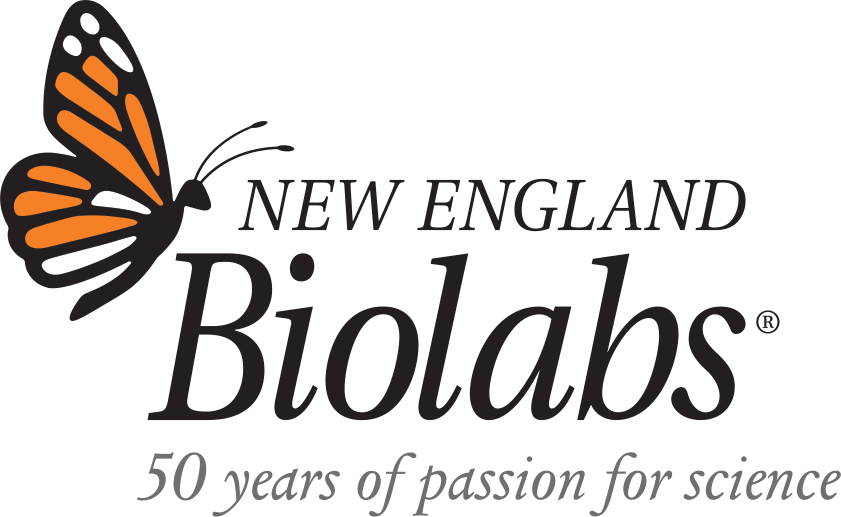
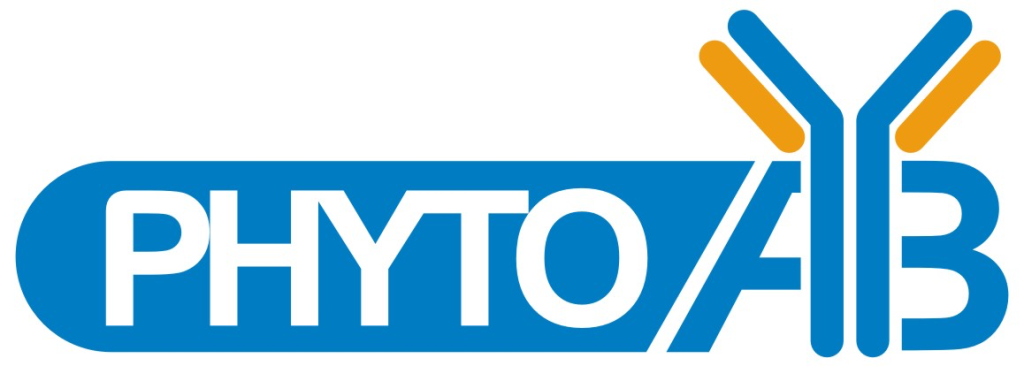
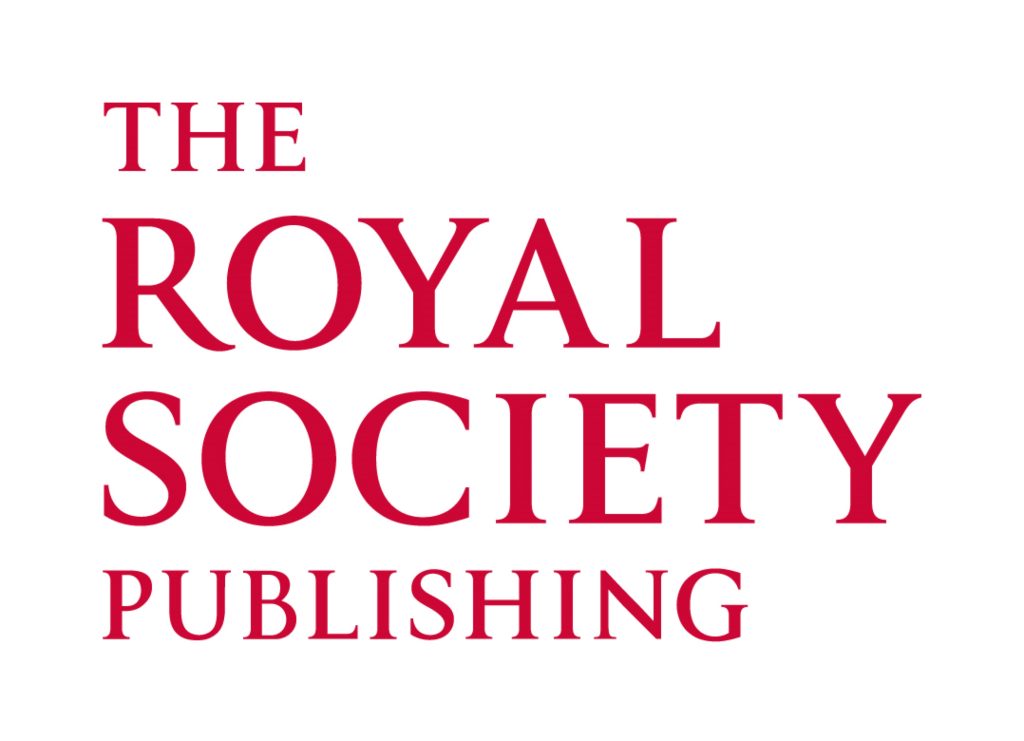

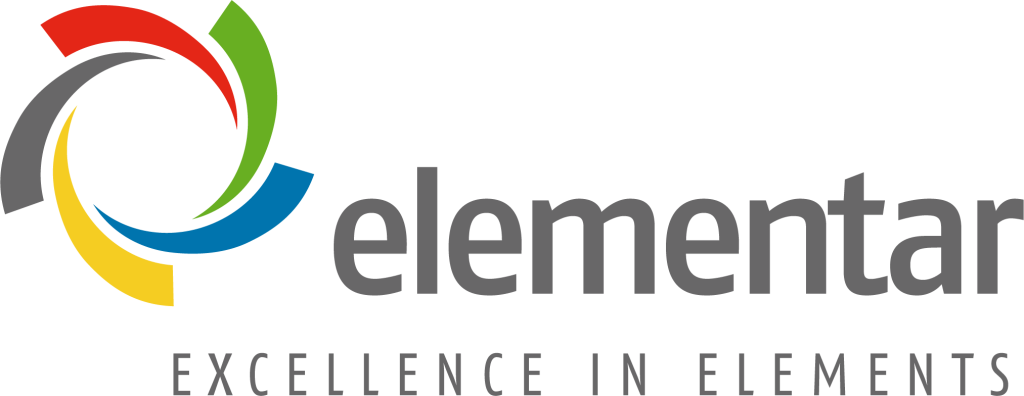
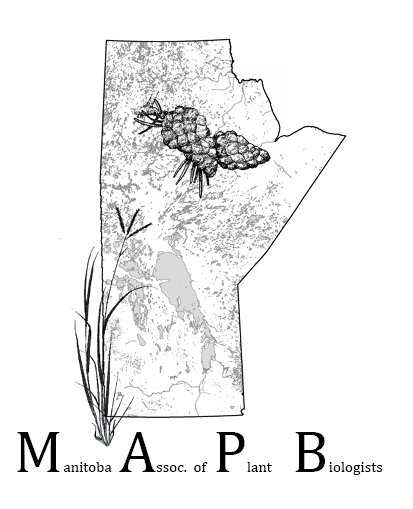
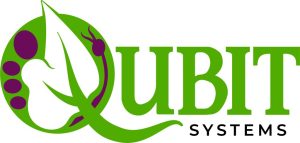
Abstract Guidelines
Thank-you to everyone who submitted abstracts for plant Canada 2024.
Abstract submission is now closed.
Submission deadline for oral presentation is May 24, 2024.
Submission deadline for poster presentation is May 24, 2024.
Participants can choose to submit an abstract for oral presentation consideration or for poster presentation. All abstracts will be reviewed by the Organizing Committee to ensure the abstracts are relevant to the meeting theme. Authors of abstracts selected for oral presentation will be contacted in June. All abstracts will be included in the final program which will also be available online after the conference. Abstracts are limited to 400 words within the ‘abstract text section’. If you have more than one abstract, each one will need to be submitted separately.
Poster presenters must be registered, fully-paid conference attendees. There is a fee of $30 for each abstract. Abstracts will not be accepted without full payment.
Physical poster specifications:
Posters must measure a maximum of 91 cm wide x 121 cm high (36 inches x 48 inches). Each will be mounted vertically and occupy one-third of one side of a freestanding poster display board. The poster board will accommodate pushpins and will be Velcro-receptive. Presenters will be provided with Velcro or pushpins for hanging their posters.
Poster content should include:
1. Title, author(s) names(s) and their affiliation(s). Letters should be not less than 2.5 cm high and preferable 5cm high.
2. Introduction, materials and methods, results, and discussion. Presenters should select a font and letter size to allow viewers to read the poster from a distance of 1.2 meters or more. (Note: a mat finish on the posters provides better visibility as it reduces glare).
3. Consider less rather than more words within your poster, and refrain from using very small font for your poster.
4. Posters will be on display during the confernce and should carry your message without requiring any additional comment.
5. Material presented must be based on the abstract previously submitted and should be novel, not previously published material.
EXAMPLE – please read carefully and follow this format for acceptance of your abstract
THIS IS THE TITLE OF MY PRESENTATION
John Smith1, Jane Doe2 and Eve Adam1
1Ottawa Research and Development Centre, Agriculture and Agri-Food Canada, 960 Carling Avenue, Ottawa, ON, Canada, K1A 0C6
2Crop Development Centre, University of Saskatchewan, College of Agriculture and Bioresources, 51 Campus Drive, Saskatoon, SK, Canada, S7N 5A8
Correspondence to: xxx@gmail.com
This is the template format for the Plant Canada 2024 abstract submission. This is where you enter the body of your abstract which should not exceed 400 words. You should use Arial 10 point font throughout. The title should be capitalized and bold. The presenting authors should be underlined. Single line spacing should be used.
Abstract Submission
Thank-you to everyone who submitted abstracts for plant Canada 2024.
Abstract submission is now closed.
Submission deadline for oral presentation is May 24, 2024.
Submission deadline for poster presentation is May 24, 2024.
Participants can choose to submit an abstract for oral presentation consideration or for poster presentation. All abstracts will be reviewed by the Organizing Committee to ensure the abstracts are relevant to the meeting theme. Authors of abstracts selected for oral presentation will be contacted in June. All abstracts will be included in the final program which will also be available online after the conference. Abstracts are limited to 400 words within the ‘abstract text section’. If you have more than one abstract, each one will need to be submitted separately.
Poster presenters must be registered, fully-paid conference attendees. There is a fee of $30 for each abstract. Abstracts will not be accepted without full payment.
Physical poster specifications:
Posters must measure a maximum of 91 cm wide x 121 cm high (36 inches x 48 inches). Each will be mounted vertically and occupy one-third of one side of a freestanding poster display board. The poster board will accommodate pushpins and will be Velcro-receptive. Presenters will be provided with Velcro or pushpins for hanging their posters.
Poster content should include:
1. Title, author(s) names(s) and their affiliation(s). Letters should be not less than 2.5 cm high and preferable 5cm high.
2. Introduction, materials and methods, results, and discussion. Presenters should select a font and letter size to allow viewers to read the poster from a distance of 1.2 meters or more. (Note: a mat finish on the posters provides better visibility as it reduces glare).
3. Consider less rather than more words within your poster, and refrain from using very small font for your poster.
4. Posters will be on display during the confernce and should carry your message without requiring any additional comment.
5. Material presented must be based on the abstract previously submitted and should be novel, not previously published material. Abstract Example
EXAMPLE – please read carefully and follow this format for acceptance of your abstract
THIS IS THE TITLE OF MY PRESENTATION
John Smith1, Jane Doe2 and Eve Adam1
1Ottawa Research and Development Centre, Agriculture and Agri-Food Canada, 960 Carling Avenue, Ottawa, ON, Canada, K1A 0C6
2Crop Development Centre, University of Saskatchewan, College of Agriculture and Bioresources, 51 Campus Drive, Saskatoon, SK, Canada, S7N 5A8
Correspondence to: xxx@gmail.com
This is the template format for the Plant Canada 2024 abstract submission. This is where you enter the body of your abstract which should not exceed 400 words. You should use Arial 10 point font throughout. The title should be capitalized and bold. The presenting authors should be underlined. Single line spacing should be used.
Hotel
The official hotel for Plant Canada 2024 is the Delta Hotel Winnipeg by Marriott.
As special rate of $179 CAD per night is being offered. The last day to book at this rate is Thursday, June 27, 2024.
Book your hotel for the Plant Canada Conference
For those wishing to make their reservations by phone, they can reach our central reservations department at 1-844-294-7309 and ask for the Plant Canada block.
Tours
Tour Option A
Visit to the Assiniboine Park Conservancy greenhouse, the Leaf Tropical Biome and tour the Conviron growth chamber manufacturing facility. Lunch provided on the Conviron Terrace. Tour capacity 40. Date, Sunday July 7, 09:00-14:00:
- 09:00: bus departs RBC Convention Centre for Assiniboine Park
- 09:30: tour of Assiniboine Park Conservancy Greenhouse
- 10:00-12:00 free time – Leaf Tropical Biome
- 12:00 bus to lunch on the Conviron terrace and factory tour
- ~13:30 bus departs for RBC
- Delegates arrive back at RBC around 2:00
Tour Option B
Visit the Leaf indoor Horticultural attraction, English Gardens, Leo Mol Sculpture Garden on your own. Date is July 7, 2024 from 9:30-2:00.
- 09:30: bus departs RBC Convention Centre for The Leaf at Assiniboine Park
- 10:00-2:00: tour The Leaf, visit the English Gardens and Leo Mol Garden on your own. It is a short walk from The Leaf to the English Gardens and Leo Mol Garden. Lunch is on your own at The Gather restaurant or Park café.
- 2:00: bus departs from The Leaf back to the RBC Centre
Cost is $30 for either tour.
Go to Life Grows at The Leaf | Assiniboine Park Conservancy to see info on The Leaf and Assiniboine Park.
Workshops
Survival in the jungle of scholarly publishing: Building authorship and peer review skills
The world of publication may look like a jungle for graduate students. Join Botany co-Editors-in-Chief Dr. Liette Vasseur and Dr. Shelley Hepworth and journal staff for an interactive workshop designed to demystify the world of scholarly publishing. From selecting the right journal to preparing your submission, learn how to set up your manuscript for success. We will walk you through the peer review process and give tips for handling a variety of different situations, whether you are encountering them as an author or a peer reviewer. We will discuss Open Science, equity and inclusion in publishing, and other topics of interest. This workshop will include breakout activities for an opportunity to participate in hands-on exercises and receive real-time feedback from journal editors and staff. Join us and learn how to map your path to success in publishing your research.
Date: July 7, 2024 from 12:00-2:00PM in Meeting Room 17
Limited to 50 participants.
Moderators: Dr. Liette Vasseur (Brock University), Dr. Shelley Hepworth (Carleton University), Rachel Pietersma (Canadian Science Publishing)
For registration, contact Dr. Minow: postdocrep@cspb-scbv.ca
R for biovigilance of phytopathogens based on metabarcoding approach
Metabarcoding combines DNA barcoding with high-throughput sequencing (HTS) technologies for rapid and high-throughput identification of multiple species from environmental samples, offering a powerful tool for biodiversity studies and ecosystem monitoring. It has transformed our ability to profile complex microbial communities and track plant pathogens in various environments.
This workshop will provide hands-on experience in metabarcoding-based community analysis using R, a versatile programming language and environment for statistical computing and graphics. You will learn about various R packages and tools that are essential for community data analysis, enabling you to effectively analyze and interpret metabarcoding data.
This workshop is designed to demonstrate how you may use metabarcoding for plant pathogen monitoring and tracking. This is crucial for early detection and management of plant diseases and for agriculture and biodiversity conservation. We will explore case studies and practical applications, highlighting how metabarcoding, combined with R analysis, becomes a potential diagnostic tool for Biovigilance of phytopathogens.
Date: July 7, 2024 from 2:30-4:30PM in Meeting Room 17
Duration: 2 hours
Limited to 50 participants.
Cost $25
Registration is on the main Plant Canada conference page.
Instructors
Dr. Hervé Van Der Heyden;
Dr. Wen Chen;
Dr. Shaheen Bibi
Dr. Carol Bvindi
Organisers
Dr. Wen Chen, Ottawa RDC, AAFC; Department of Biology, uOttawa
Dr. Hervé Van Der Heyden, Saint-Jean-sur-Richelieu RDC, AAFC
Dr. Guillaume Bilodeau, CFIA – Fallowfield
Developing a Community of Practice for Plant Biology Teaching
Join us to discuss the ins and outs, ups and downs, and tips and tricks for teaching plant biology. You’ll leave the session with new ideas for your teaching and new resources and connections to help make your ideas a reality. Beyond that, you’ll be part of a team laying the groundwork and planting the seeds for an online community of like-minded colleagues across the country who believe in plant education and supporting the people who teach it. Participants of all career and experience levels are welcome!
No registration required for conference attendees!
https://cspb-scbv.ca/Education-Committee-Events
Date: July 8th, 2024 from 11:15AM-1:00PM (1hr 45min)
Limited to 50 participants.
Moderators: David Bird, Lauren Erland, Miranda Meents, Robin Young, Solmaz Irani
Bioinformatics 101: Your first steps into the world of ‘omics’ data analysis
Join us to discuss the basic bioinformatics skills researchers need to begin working in ‘omics’. The workshop will come in two parts. In the first, we will provide a hands-on training that showcases basic command-line coding that will illustrate the power of BASH for data handling and processing of immensely large omics datasets. In the second part we will discuss RNA-seq, the various steps involved and considerations when setting up your first RNA-seq experiment. Ultimately, this workshop is intended to be a first introduction to bioinformatics and as a forum to ask any questions you may have if you intend to have bioinformatics as part of your future research. For Mac/Linux users, you are ready to start command-line tomorrow! For PC/Windows users, consider downloading ‘MobaXterm’ before attendance so that you are ready for working in a Unix environment (https://mobaxterm.mobatek.net/)!
No registration required for conference attendees!
Date: July 9th, 2024 from 11:30AM-1:00PM
Location: Millennium Room
A Brief Overview of the Gene Editing Landscape in Canada
Plant Biotechnology is at the forefront of scientific innovation in Canada, harnessing diverse tools and technologies to enhance plant genetics and yield products of agricultural, environmental or industrial value. The Plant Biotechnology sector significantly contributes to Canada’s economy, providing 15,000 jobs and over $2 billion to the GDP each year. Beyond scientific and economic prowess, its influence also permeates regulatory frameworks and societal perspectives, shaping its impact on society, the economy and the environment. As a trailblazer in the realm of Plant Biotechnology, Canada is now witnessing a compelling chapter in its scientific narrative, strongly influenced by evolving guidelines amidst the rapid development of genome editing technologies and the adoption of gene-edited crops. Please join us for an open discussion about the gene editing landscape in Canada. Different aspects of the question will be addressed by the panelists, from the basic concepts of gene editing to the regulation, IP protection and commercialization of gene-edited crops and products.
Date: July 9th, 2024 from 11:15AM–1:00PM (1hr 45 min) in the Presentation theatre
Moderator: Dominique Michaud (Laval U)
Panelists: Stacy Singer (AAFC), Hannah Clouthier (CFIA), Jennifer Hubert (CropLife Canada), Steve Webb (GIFS), Pankaj Bhowmik (NRC)
Registration Rates
Registration fees include breakfast and lunch on Monday, Tuesday, and Wednesday, and also cover the welcome reception on Sunday night and all-society banquet on Wednesday night.
| Early | Full | |
| Member | 750 | 850 |
| Post-Doc / RA | 450 | 550 |
| Student | 450 | 550 |
| Emeritus | 250 | 350 |
| 1-Day | 250 | 350 |
| Companion | 100 | 200 |
| Non-member | 850 | 950 |
| PD/RA non-member | 550 | 650 |
| Student non-member | 550 | 650 |
Conference registration is expected to start in early February. The early-bird rate ends on May 17, 2024.
The Delta Marriott Winnipeg will be the conference hotel, with a rate of $179 plus taxes. Reservations must be received on or before Thursday, June 27, 2024.
For questions please contact Tom Fetch , Dilantha Fernando or Brenda Trask.
